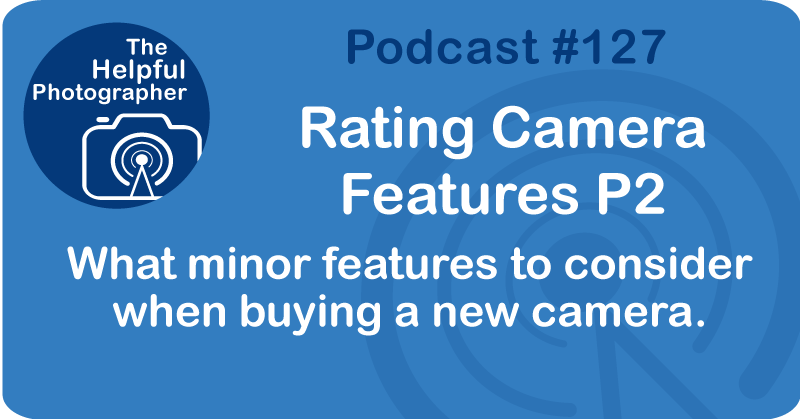P2 Rating Camera Features #127

This is a follow-up podcast for Vicky and Tulsa. In the last pod, I talked about some features that can have a big impact on the price of a camera. The features I'm gonna discuss today will have very little to no impact on the price of the actual camera, but some manufacturers like to make it a sell point. So are the actual sell points? Let's jump in.
The first is the number of lenses available. With the current move to mirrorless, some manufacturers are further ahead than others in developing and bringing to market a big variety of lenses for their mirrorless lineup. While Sony has over 70 E-mount lenses, Canon is on the bottom with only 35. But here's the question. Are you buying all 70 lenses? Or are you just buying the holy trinity? If the lens you really need is not in the lineup, this is a problem. And perhaps you need to consider a different camera body. The number of lenses a manufacturer is offering is probably not a big deal for the vast majority of photographers. But what about third-party lenses? I'm not a big fan of third-party lenses, so that's not even a consideration for me. You can check out episode #47 for that information. You'll also want to check out the manufacturer's prices for their lenses, as this can be incredibly different.
Next up, metal versus plastic. Some manufacturers make a big deal about the fact that they're using metal rather than plastic parts. There are pros and cons with this. Metal is rather heavy and won't bounce. If you drop it hard enough, it will dent, and that's the end of that. On the other hand, any lens with plastic parts is likely made with high-end glass-infused plastic, which will be significantly lighter, and it's going to have a little bit more give than metal. But again, if you drop it hard enough, it's probably gonna crack. Bottom line is that metal is not the end-all be-all and plastic is not the negative that it used to be. There are downsides to both.
Another sell point that I've been seeing is color. I'm talking about how the camera renders the colors you're photographing or whether or not you can apply electronic filters like you do on Instagram. Personally, I don't think this is a big deal either. If you're shooting RAW, any modern camera is going to give you so much information that you can pretty much do whatever you want in post-process. If you're just shooting JPEG, how the camera decides to process the image will play a more important role in your photos than if you're shooting RAW. And I do hesitate to say that you "should" be shooting RAW. Everyone has different needs in photography and it's really rare that there's only one path for everyone.
What about in-camera noise reduction, HDR or upscaling of images? So in other words, processing your images in your camera. Personally, I think most of this is useless. Let's put it this way. If you have a four minute exposure, you are looking at a four minute noise reduction. Why would I do this in camera when I can do this on my computer and it literally takes 10 seconds? I'm gonna be out there shooting a long time and if I'm gonna double my time for every time I press the button, that's gonna be a pain. Furthermore, do you really think Canon or Nikon's post-processing software beats Adobe? A company that has devoted millions of dollars into just post-processing software? And isn't your computer software so much more powerful than the camera? I think it's going to be able to handle stuff a lot better. And lastly, seriously, are you going to take those pictures and then eventually sit down with your camera and do your post-processing in your camera? Personally, I don't see it. If I'm out there working, I don't even do the post-processing until I get back into my office. I don't even have Lightroom on my travel computer, and I'm gonna be gone for two to three to four weeks. I don't even bother. It takes way too much time, and I have better things to do, like go out and do more shooting. As you can see, I pretty much don't think there's a lot of benefit to have anything that can be accomplished in post-production.
For the most part, these are the only bells and whistles that I can think of that you shouldn't give a camera much credit for. The stuff in the previous podcast are a lot more important factors. In the next podcast, I'm going to talk about when it's time to upgrade your equipment. I hope this was helpful. Until next time, keep on shooting.











